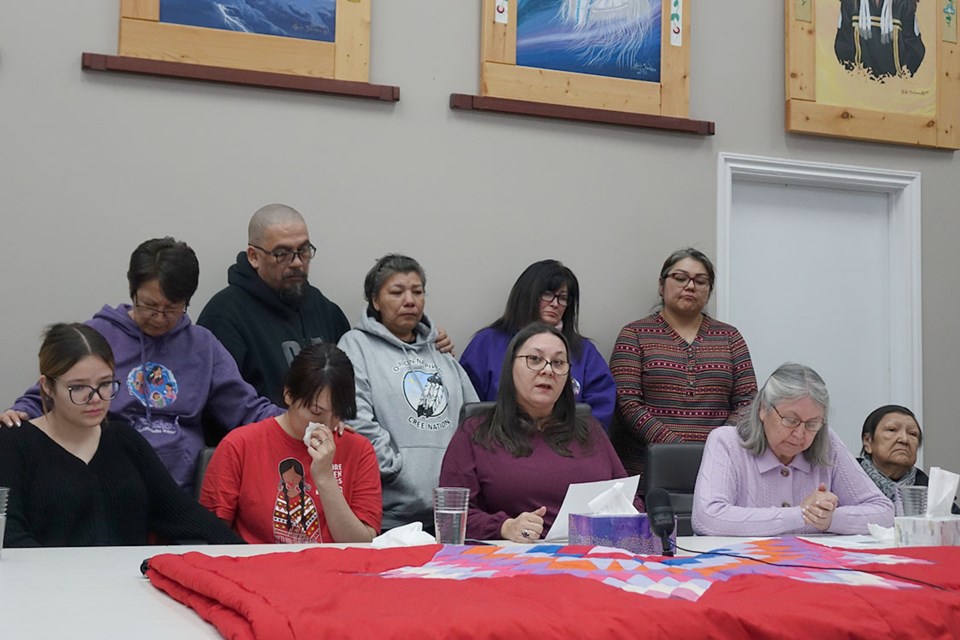The family of a South Indian Lake woman who died Feb. 21 after being assaulted two days earlier say her death is not only a tragedy for the loved ones she left behind but also a sign of the struggles many in the community are facing.
Noreen Tait, 47, died in hospital in Winnipeg on Feb. 21 after having been taken to the nursing station in O-Pipon-Na-Piwin Cree Nation on Feb. 19, suffering from injuries believed to have resulted from an assault.
Arla Tait-Linklater, Noreen’s older sister, said at a press conference in Thompson on Feb. 27 that her death has been shocking and traumatic to them all.
“Noreen has left a huge void in our hearts,” she said. “The senseless way her life was taken is difficult to comprehend and devastating to the family.”
Like many other residents of the community a few hours north of Thompson, which doesn’t have year-round access, Noreen dealt with multiple struggles throughout her lifetime, including two strokes, having been raised by parents who both attended residential school and being born around the time that the Churchill River was diverted for hydroelectric generating purposes, which flooded much of OPCN’s traditional territory and decimated the commercial fishery that had been the community’s economic basis.
Chief Shirley Ducharme says the monthly statistics she receives from the community’s RCMP detachment, which has a complement of four officers, two of whom are on duty at any given time, are shocking. She believes many of the First Nation’s members who abuse drugs and alcohol are doing so to cope with emotional trauma and mental health issues, which they must wait a long time to have treated.
“Our people are wanting to heal, to get treatment,” she said. “But they have to wait three months, six months down the line before there’s an opening here in Thompson or even in Nelson House. There is not that immediate resource there for them to seek the help when they need it.”
Although the community has one First Nation safety officer and one person being trained to become one, Ducharme says there aren’t a lot of people who want to take on that role to help keep the community safe.
Manitoba Keewatinowi Okimakanak vice-chief and Pimicikamak Cree Nation Chief David Monias says that is because they face real danger while not having the same level of protection as RCMP officers or earning anywhere near as much money.
More important than police, however, are preventative services.
“[Police] come after the fact, when somebody’s been hurt or somebody’s been killed,” Monias said. “Our people deserve better and they should be provided with better so we can stop these things from happening to our people, stop our women being murdered, our men being murdered and stop our children from being hurt and murdered."
The impact of Noreen Tait's death is not limited to those who were related to her and loved her.
“We have a small community,” Ducharme said, noting that a vigil for South Indian Lake’s latest victim of a homicide drew participants that included others affected by a previous killing.
There is also the risk of knock-on effects, said Tait-Linklater, when people are left on their own to try to work through the grief of losing someone close to them violently and suddenly.
“Mental health crises escalate when something like this happens and a lot of people use alcohol and drugs because there are very limited resources in the community to be able to have an impact on people’s mental health so that further creates more problems,” she said.
Heidi Spence, director of MKO’s Missing and Murdered Indigenous Women and Girls liaison unit, which has been providing support to Noreen Tait's family since her death, says it’s important that family members and communities don’t accept violence as normal and unavoidable.
“It’s really important to send continuous and strong messages when this type of violence occurs in our communities because it doesn’t just affect a family, it affects an entire community,” said Spence.
No arrests have been made, but suspects have been identified in Noreen Tait’s death, Manitoba RCMP spokesperson Sgt. Paul Manaigre told the Winnipeg Sun Feb. 23..
O-Pipon-Na-Piwin Cree Nation Chief Shirley Ducharme says members of the First Nation are trying to cope with emotional and mental health problems by abusing drugs and alcohol, which fuels violence in the small remote community.




